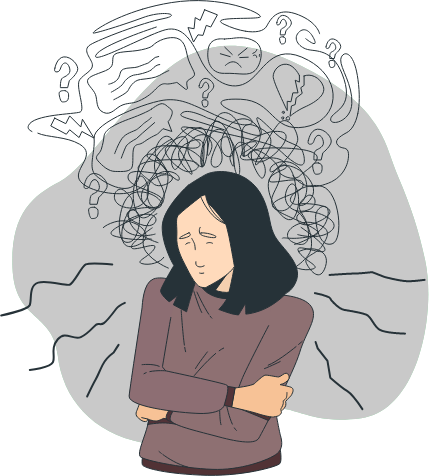Our greatest glory is not in never failing, but in rising up every time we fail.
Ralph Waldo Emerson


According to the World Health Organization (WHO), stress can be defined as a state of worry or mental tension caused by a difficult situation. Stress is a natural human response that prompts us to address challenges and threats in our lives. Everyone experiences stress to some degree. The way we respond to stress, however, makes a big difference to our overall well-being.
Stress affects both the mind and the body. A little bit of stress is good and can help us perform daily activities. Too much stress can cause physical and mental health problems. Learning how to cope with stress can help us feel less overwhelmed and support our mental and physical well-being.

What: A practice where you focus your attention and eliminate the jumbled thoughts that may be crowding your mind and causing stress.
Why: Improves your emotional wellbeing (ex: increasing self-awareness) and helps with depression and anxiety.
How: Guided Meditation: You form mental images of places or situations you find relaxing (e.g., the beach, the mountains, a quiet coffee shop).
Mantra Meditation: You silently repeat a calming sound, word, thought, or phrase to focus on and prevent other thoughts from entering your mind.
Yoga: You perform a series of postures and controlled breathing exercises to promote a more flexible body and a calm mind.
What? Sleep allows for important body functions and brain activity to occur. Millions of people suffer from lack of sleep. For example, surveys conducted by the National Science Foundation (1999-2004) revealed that at least 40 million Americans suffer from over 70 different sleep disorders. Teens report sleeping far less than the minimum age-based recommendation of 8.5 to 9.25 hours. On average, teens say they sleep 7.4 hours a night on a school night and 8.1 hours a night on a non-school night.
Why? Skipping sleep can be harmful — even deadly, particularly if you are behind the wheel.
Remember, a brain that is hungry for sleep will get it, even when you don’t expect it. The brain requires sleep for physical, mental, and emotional health. You are more prone to sickness, mood swings, mistakes, and forgetting when you don’t get enough sleep.






What? Physical activity can happen anywhere – at a gym nearby or with a quick walk in the neighborhood. Exercising is an easy way to help reduce the feelings of stress because it produces endorphins (chemicals in the brain that act as natural painkillers) and improves your sleep, which also reduces stress. Regular aerobic exercise (cardio) has been shown to decrease overall levels of tension, elevate and stabilize mood, improve sleep, and improve self-esteem. Even five minutes of aerobic exercise can stimulate anti-anxiety effects.
Why? Stimulates various brain chemicals, such as endorphins and dopamine, that leave you feeling happier and more relaxed. Also increases and strengthens new brain cells and connections, which improves your memory, alertness, and attentiveness, leading to faster learning.
How? Running, walking, biking, hiking, playing a sport, working out in the gym, swimming, dancing, kickboxing, etc.

What? One of the most obvious, yet under-recognized factors of mental health is the role of nutrition. Nutrition impacts short and long-term mental health; evidence indicates that food plays an important role in the development, management, and prevention of specific mental health problems such as depression, schizophrenia, attention deficit hyperactivity disorder, and Alzheimer’s disease.
Why? Foods with high vitamin and mineral levels actively help to reduce stress levels. Certain foods that we think of as providing comfort actually do so by increasing our hormones that naturally fight stress. Other types of foods and beverages, including caffeine, can reduce stress by lowering the levels of hormones that trigger it.
How? Eating healthy does not mean eating solely organic food. Small changes can make a big difference to your health.
What? The purpose of coloring is to increase your stress management toolbox by taking you back to your childhood with this simple technique. Why? Research shows that the act of coloring, and the simple and singular focus it brings, lowers stress hormones found in the amygdala, the part of our brain responsible for controlling emotions, allowing us to focus and concentrate better. New research is beginning to show coloring lowers symptoms of anxiety and depression as well as decreases stress levels and heart rate.
How? Before you begin coloring, take three deep breathes in and out. Then, begin coloring for at least 15 minutes. Mandala coloring pages are often used when coloring for stress relief because of their intricate details and complex designs, but any coloring page works to the same effect. Mandala’s are geometric figures that represent the universe in Hinduism and Buddhism.

Sometimes all you need is someone to talk to who might understand what you're going through. Find someone that you feel comfortable talking to if it is a relative, teacher, friend, or mentor. It will be hard at first to open up, but they might have experienced the same thing or might know how to get you help.
Stress can be little things, such as dealing with schoolwork, relationship struggles, or stress with work. Regardless of the situation, it is always important to share. It is better to deal with your stress NOW than to let it bottle up. If you continue to bottle it up, it can lead to other problems, such as limiting your ability to focus in school or at work. It could lead to more stress in your life and even cause you to get sick.